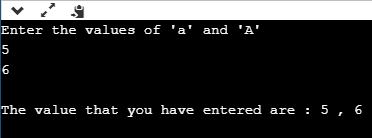C++ IdentifiersC++ identifiers in a program are used to refer to the name of the variables, functions, arrays, or other user-defined data types created by the programmer. They are the basic requirement of any language. Every language has its own rules for naming the identifiers. In short, we can say that the C++ identifiers represent the essential elements in a program which are given below:
Some naming rules are common in both C and C++. They are as follows:
For example, suppose we have two identifiers, named as 'FirstName', and 'Firstname'. Both the identifiers will be different as the letter 'N' in the first case in uppercase while lowercase in second. Therefore, it proves that identifiers are case-sensitive. Valid IdentifiersThe following are the examples of valid identifiers are: Invalid IdentifiersThe following are the examples of invalid identifiers: Note: Identifiers cannot be used as the keywords. It may not conflict with the keywords, but it is highly recommended that the keywords should not be used as the identifier name. You should always use a consistent way to name the identifiers so that your code will be more readable and maintainable.The major difference between C and C++ is the limit on the length of the name of the variable. ANSI C considers only the first 32 characters in a name while ANSI C++ imposes no limit on the length of the name. Constants are the identifiers that refer to the fixed value, which do not change during the execution of a program. Both C and C++ support various kinds of literal constants, and they do have any memory location. For example, 123, 12.34, 037, 0X2, etc. are the literal constants. Let's look at a simple example to understand the concept of identifiers. In the above code, we declare two variables 'a' and 'A'. Both the letters are same but they will behave as different identifiers. As we know that the identifiers are the case-sensitive so both the identifiers will have different memory locations. Output 
What are the keywords?Keywords are the reserved words that have a special meaning to the compiler. They are reserved for a special purpose, which cannot be used as the identifiers. For example, 'for', 'break', 'while', 'if', 'else', etc. are the predefined words where predefined words are those words whose meaning is already known by the compiler. Whereas, the identifiers are the names which are defined by the programmer to the program elements such as variables, functions, arrays, objects, classes. Differences between Identifiers and Keywords The following is the list of differences between identifiers and keywords:
Next TopicC++ Expression
|
 For Videos Join Our Youtube Channel: Join Now
For Videos Join Our Youtube Channel: Join Now
Feedback
- Send your Feedback to [email protected]
Help Others, Please Share










